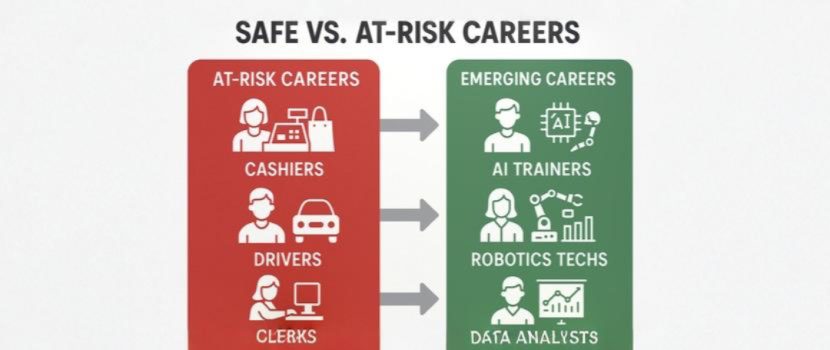
August 20, 2025
AI isn’t just replacing jobs—it’s transforming them, reshaping how we work, and giving rise to entirely new industries that didn’t exist a decade ago. Roles like AI ethicist, data curator, and virtual environment designer are emerging alongside traditional careers that are evolving with tech-infused skillsets. This shift demands not just technical knowledge, but adaptability, creativity, and emotional intelligence. For educators, it’s an opportunity to reimagine teaching—not just to prepare students for jobs, but to equip them to thrive in careers that are still being invented.
For teachers, this isn’t just a trend—it’s a call to action. By nurturing adaptable mindsets, digital fluency, and human-centered skills, educators can guide students toward the careers that don’t yet exist but will define their future.The careers that survive the AI wave will be those rooted in creativity, empathy, and critical thinking. And the classroom is where that foundation begins—with you.
Here is breakdown of careers that will evolve with AI and those that are at higher risk of becoming obsolete.
Careers That Will Evolve (AI will enhance, not replace)
Healthcare Professionals (Doctors, Nurses, Therapists)– AI will assist in diagnosis and treatment, but human empathy and judgment remain crucial.
Teachers and Educators– Will shift from delivering content to guiding personalised learning powered by AI.
Software Developers & AI Specialists– Roles will evolve toward supervising, training, and integrating AI systems.
Data Analysts & Data Scientists– Will focus more on strategic insights and ethical oversight as AI handles data crunching.
Creative Professionals (Writers, Designers, Filmmakers)– AI tools will accelerate creation, but original ideas, storytelling, and brand understanding will still be human-led.
Managers & Leaders– Will need stronger emotional intelligence, decision-making, and strategic skills as AI handles routine tasks.
Cybersecurity Experts– Constantly evolving to counter AI-powered cyber threats.
Careers at Risk of Becoming Obsolete (AI can easily automate)
Data Entry Clerks & Routine Administrative Roles– AI can process data faster and with fewer errors.
Telemarketers & Customer Service Agents (basic queries)– Chatbots and voice AI can handle standard interactions.
Cashiers & Retail Checkout Staff– Automated self-checkout and AI-based payment systems are replacing these roles.
Basic Accounting & Bookkeeping Roles– AI-powered software can manage invoices, reconciliations, and taxes.
Transportation & Delivery Drivers– Autonomous vehicles and drones are likely to reduce these jobs in the future.
Manufacturing Line Workers (simple assembly tasks)– Industrial robots are increasingly cost-effective.
New Careers AI Will Create (Jobs emerging in the next decade)
AI Ethics & Bias Auditors– Professionals ensuring AI systems are fair, unbiased, and ethical.
Human-AI Collaboration Specialists– Helping teams use AI tools effectively and responsibly.
AI-Powered Healthcare Technologists– Developing personalised treatments using AI-driven diagnostics.
Virtual World & Metaverse Designers– Creating immersive online worlds for education, work, and entertainment.
Data Privacy & Digital Security Consultants– Safeguarding personal data from AI misuse.
Sustainability Analysts using AI– Leveraging AI for climate modeling and eco-friendly innovation.
AI Trainers– Teaching AI systems how to interpret data (e.g., labeling, contextual understanding).
Prompt Engineers– Specialists in crafting precise inputs to get the best output from AI models.
Teachers are the bridge between today’s curriculum and tomorrow’s careers. Use this shift as an opportunity to integrate future-ready skills into your lessons—and prepare students not just for exams, but for the world they’ll inherit.
“As the world of work transforms, educators must transform too. This article is your starting point—a resource to help you spark meaningful conversations, guide informed choices, and future-proof the next generation.”